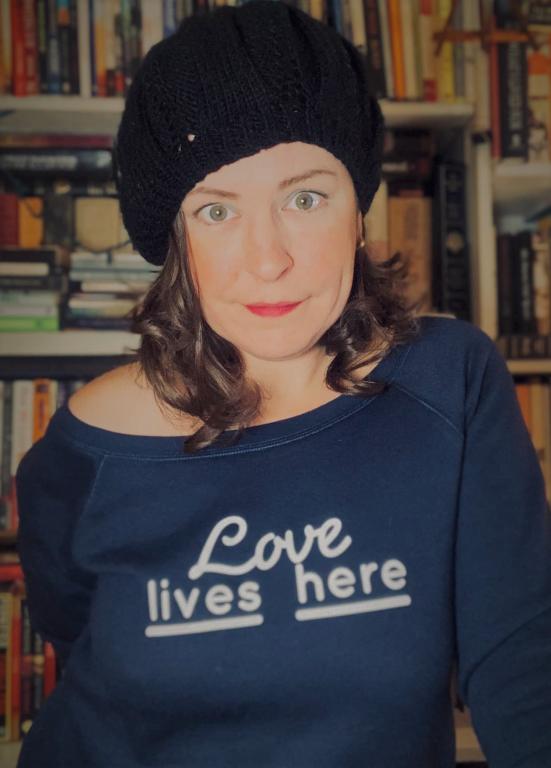
For nothing is secret that will not be revealed, nor anything hidden that will not be known and come to light. (Luke 8:17, NKJV)
I am one of those people that like attention and at the same time, I like hiding. It’s a weird dance that I go through. Carefully choreographed steps that lead me, two steps at a time, either toward the center stage or behind the curtain, backstage. I don’t think I am alone. I think we all naturally ebb and flow in that way, we seek attention and then hide from it when it becomes too much.
Take yesterday for instance. I received more attention than I knew what to do with. Such is what happens when you are retweeted by a verified blue checkmark on Twitter. I confronted a “known” media personality about her refusal to see that her nationalistic pride was contradictory to the teachings of Christ. She, a conservative vocal piece for The Blaze, and her followers did not like my contradiction and so the attention was abundant—to say the least.
I received all that attention and for a moment, I wanted to hide. I was called a “troll.” It was assumed that I was just trying to acquire clicks for my blog. Of course, it did appear that way on the surface once the exchanges began. To my defense, I got tired of the accusations and assumptions, and so the only response I gave was either a link to this blog site or my podcast. I could have deleted the tweet and pretend it didn’t happen. But I opted to not hide.
Nonetheless, today, after that overwhelming attention, the thought of remaining in bed all day under the covers crossed my mind. Hidden from the world and from attention. If only I could make that choice today. Instead, I reflected.
I noticed something rather profound. We label people who seek attention in a negative sense. As if wanting attention is a bad thing? In the social media sphere, those who are seeking attention are called what I was called: “trolls.” When I was little, the word troll signaled fairy tale villains—the trolls live under the bridge. They keep secret passwords and make you guess what they are before crossing the treacherous bridges to happily ever after.
My children, however, we’re introduced to a world of trolls that are small, colorful little singers who are happy all the time. They fight off battles and potential wars with peace and love, and a lot of singing. So, what is a troll, really? And is it good or bad?
Let’s step back for a moment.
I was told by others, that as a child, I needed to be the center of attention. I wanted all eyes on me. I wanted everyone hanging on my every word. People would tell me to remind me that I needed to learn my place and take turns so that I didn’t always have the spotlight. It’s how I was taught to listen—I was told to “shut up.” Interestingly, that’s how adults tell one another to listen, too. “Shut up!”
I was a child, however. And now, as a mother of 5, I have come to see that all children are like that—seekers of attention. It wasn’t just me. If I had to guess as to why initially I would point to the fact that the first 9 months of a child’s life are hidden in a womb. Obviously, as they become aware of their surroundings, from a self-centered view, they adore attention and seek more of it because they understand how it makes them feel. Attention makes them feel seen. Attention means they are fed, held, have their soiled diapers changed, and, attention is the way that we tell our children that they matter. The attention we give children signifies to them that they are a person, that their identity matters, and that they are included. Yet, we only extend this form of attention for so long then retract it.
As we grow older, we are told to not seek attention. We are told to shut up. We are told that seeking attention is just a means to feed the ego and get our own way. I was told that it was selfish to want attention, especially as a mother.
But what if the push to not seek attention is what grows the ego? What if trolls aren’t just irritable, deformed incels that live in the darkness of swamps and under bridges, but people who have been told all their life that seeking attention is bad? Maybe, they are simply people who have been told to “shut up!” and just let others speak. What would that mean if we stripped away that label, for just a moment to consider a new view?
Well, if we consider that children seek attention to be seen and heard. Why should we believe adults are any different? It is not (just) that others are seeking a way to feed their egos or get their own way; (sometimes) they are seeking a way to find a connection. Attention = Connection.
Did I just give internet trolls permission to besmirch all those they disagree with? No. On the contrary, I am shedding light on how to “deal” with attention-seeking individuals, who, underneath all their disguises, are just searching for connection.
Does that mean that I self-identify as a “troll”? No, I do not. But I am sure that I have been guilty of projecting onto others in a way that seemed like I was worthy of the label.
Revealing What’s Hidden
People are quite revealing in simple exchanges. If you’ve ever engaged in a heated discussion about the Bible and beliefs about God with someone else, you’d probably recall how glaringly obvious their fears are.
The reason I received so much flack for my commentary is that I challenged the status quo. Challenging the way things are for a lot of people sends shockwaves through their system. Their fight/flight/freeze responses instantly activate. The patterns of hive programming rev up the habitual rhetoric engine and the typical reactions come into articulation. Put another way, people just say crap that they’ve always said to defend what they’ve always believed and none of that requires reflection or process. Not much thought goes into what they say (or type).
When you jolt people into a state of frenzy by being the oddball that doesn’t agree with the twitter gods, their egos take over. But their egos cannot hide the fears that are seeping through the sides. If you tell a person that their Bible doesn’t say “God condones nationalism”, that forces them to consider their entire identity is a lie and no longer justified. If you tell a person that hell isn’t real, that means that all the people they want to see burn in hell never will. This means, for them, they aren’t really honoring God or really following Jesus’ way.
When you upset people’s ideas they react. They react to defend their own justifications to allow their fear and their trauma to be the reason they are so hateful and narrow-minded. No one ever gave them permission to offer grace to others, so they refuse to offer it onward. More than that, no one ever gave them space to think critically for themselves, they were just told what to think. Such is why they want to tell others what to think but not why. (I can relate to this on so many levels, can you?)
They believe God hates “evil” (whatever the defining action of evil it may be at the time); therefore, they can hate in like, and in doing so, it is loving and just. Point out how contradictory that is to people and they don’t know what to think anymore! Well, most of them will just call you a troll.
A Trolling Commonality
The one thing I notice that all “trolls” have in common is that they are only relegated to such status if they speak against the groupthink consensus. It doesn’t matter which side of the political spectrum you vote for or not, whether you believe in God or not. The slanderous term is reserved for those we don’t understand—who says something different than we are used to hearing.
I was deemed a “troll” because my way of believing didn’t match the whole group. 5 years ago, I would have called this version of me a “troll” too. I have called others “troll” because their opinions did not match mine. But when the pushing back occurs, it ultimately reveals our fears. Our fears of our identity changing if we change our minds about what we think.
In this day in age, the reason we tell people to shut up is that we equate listening to an agreement. We’ve been convinced by other models—be it athletes with purple hair, podcast hosts that hate Trump, talk show hosts, and even presidential candidates—that the willingness to give attention to someone with an opposing view means that we are giving them a platform and a microphone to spread their hatred and lies.
If we are willing to give someone space to talk out what they think, they might brainwash us!
I think it’s safe to assume that if we listen to another, we are not going to be brainwashed. We may be able to see what it is they fear. When we know what they fear, we can better address the exchange of ideas without adding scary details to their already threatened mind frame. Giving another person attention does not mean that we are agreeing with them. It means we are willing to shut up our ego and let the Other share their perspective. We all could use a little more perspective.
All of this to say, we should be more mindful of those seeking attention. It’s when we don’t pay attention that we miss what’s being revealed by the other, mainly their fear. I think all people are trying to find a way to reveal what they fear. I believe that deep down, people really want to unleash the heavy burden of what weighs down on them. The fear, however, is that by revealing too much, we can be hurt. Most of us fear pain more than anything, so this makes sense.
What if in our aims to interact with one another, we didn’t consider pain to be a necessary interlocutor of the conversation? What if instead of rehearsing the programmed platitudes, we stopped, told our ego to shut up, and listened to the other side? Can we put away this idea that we equate listening to agreement and endorsement? Can we remember what it was like to be a child and know that attention means “I hear you” and “I see you” and nothing more than that?
I wonder if we all know what it feels like to want to be seen and heard? I wonder if we all reminisce about those days when we were young and when the attention we received meant “you matter”?
Perhaps we all feel like we must remain hidden, even if it is beneath our fears because we fear that revealing ourselves equals pain. What would it look like if we didn’t want to hide under the covers and we had the confidence to reveal all things hidden? What would it look like if we all stripped down our fears and reveal ourselves naked and unashamed?












